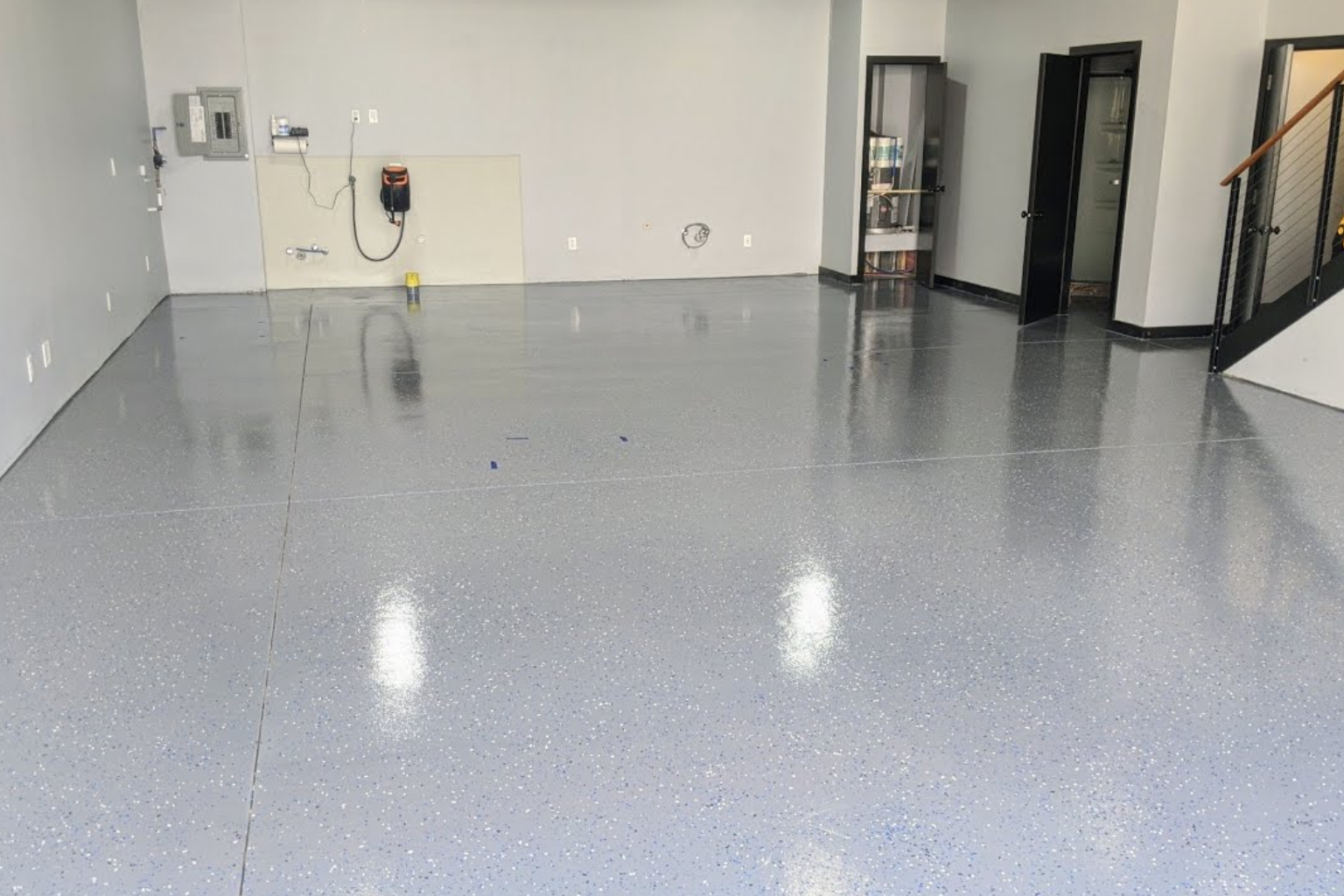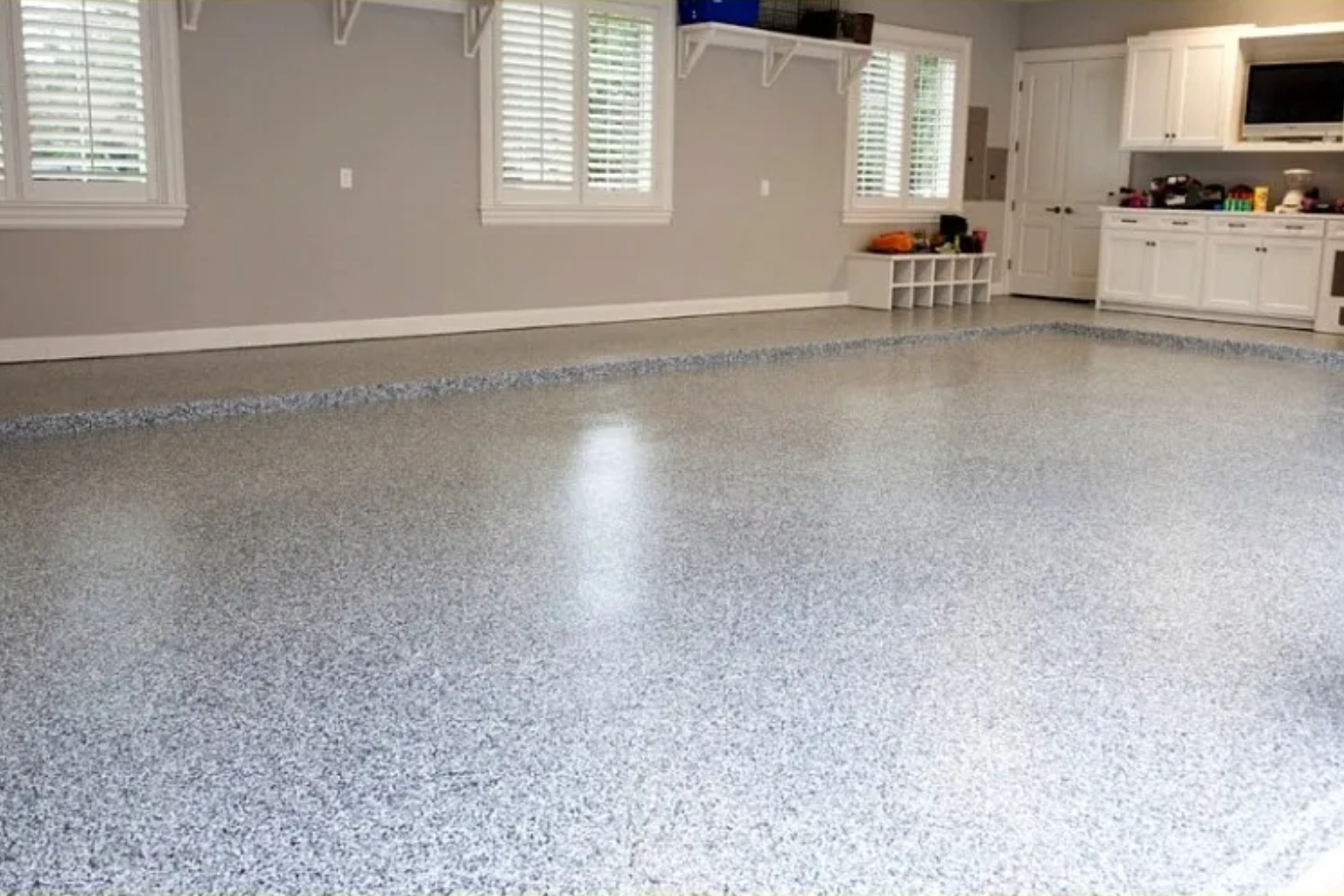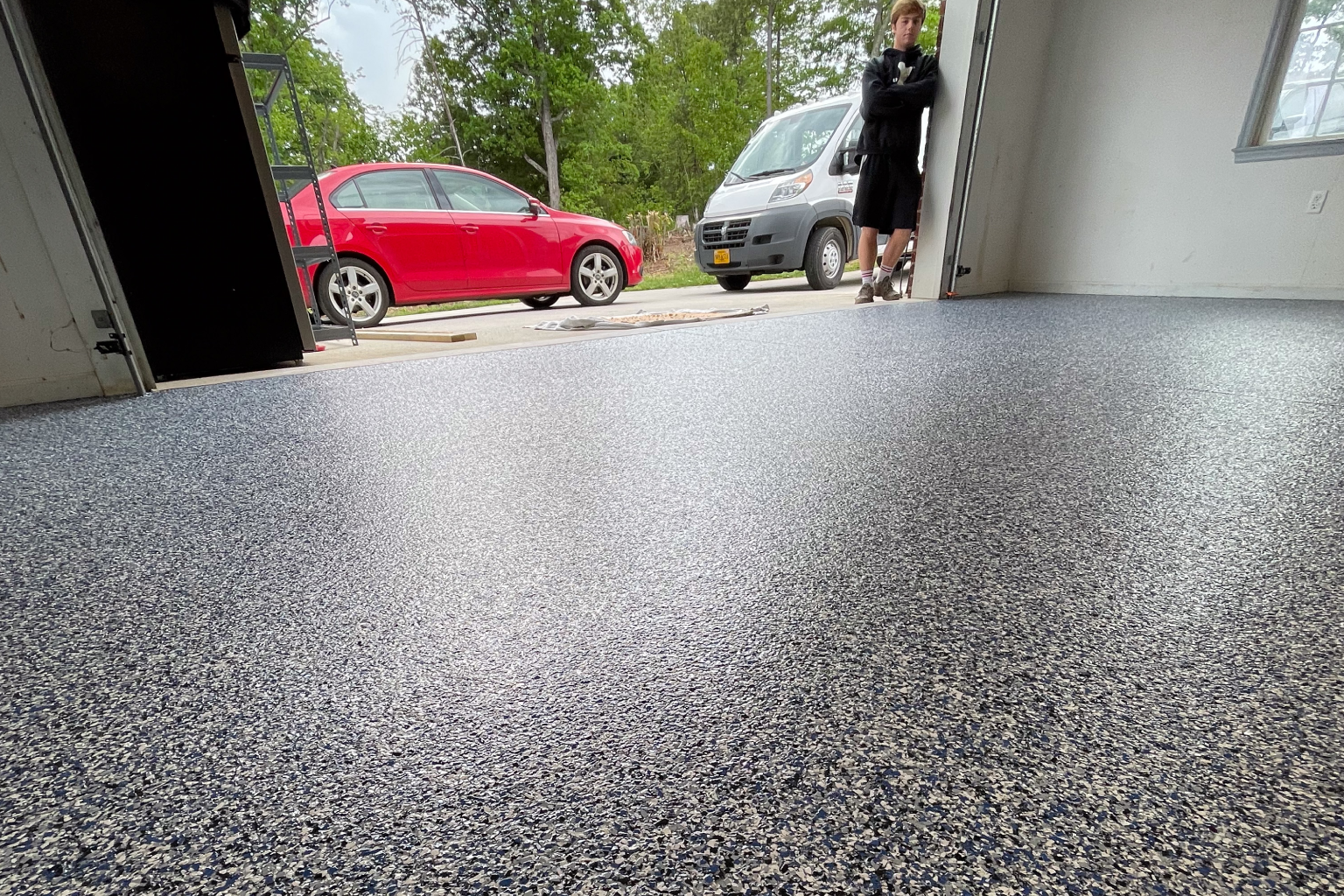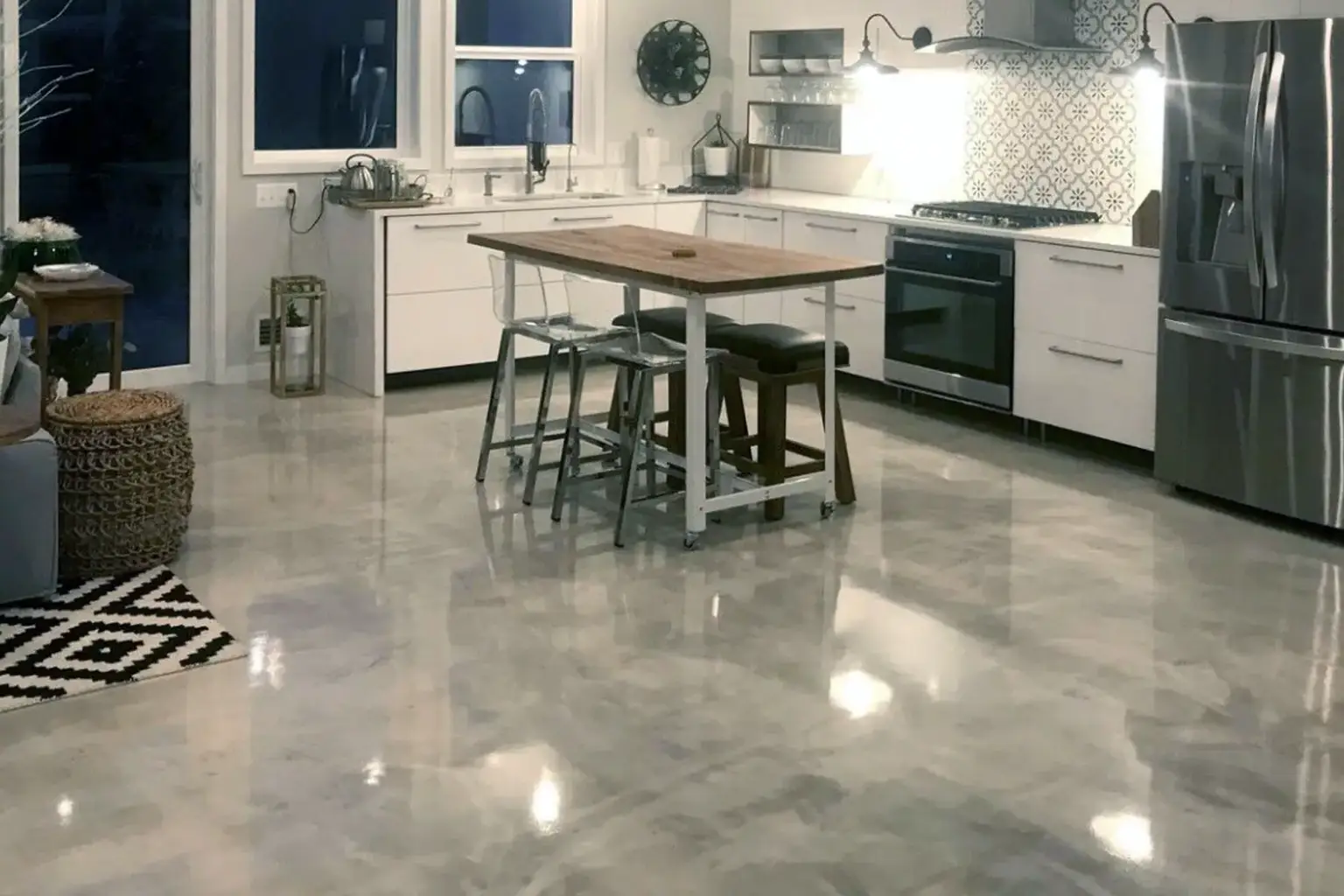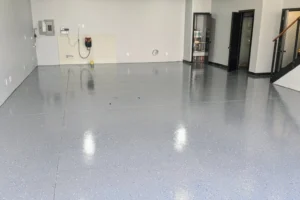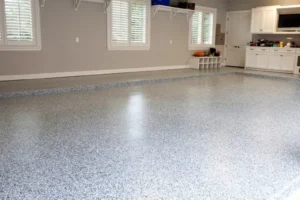Upgrading your home’s flooring is one of the most impactful ways to improve both aesthetics and functionality. Homeowners are increasingly choosing residential epoxy flooring because these options offer durability, low maintenance, and versatile design.
From solid color epoxy floors to epoxy flake, quartz epoxy, and metallic epoxy, each type provides unique benefits depending on the room and style. But one of the biggest questions is: “How much will it cost?”
This guide covers residential epoxy floors cost, including cost ranges, factors affecting pricing, maintenance tips, and ways to save money.
Residential Epoxy Flooring Costs by Types
Before you start planning your home’s flooring design, it’s a good idea to get a general sense of what residential epoxy flooring might cost. On average, homeowners spend around $3 to $12 per square foot, depending on factors like the size of the area, the type of epoxy, how much surface prep is needed, and the kind of finish you choose. Outdoor epoxy flooring comes in a variety of colors, finishes, and patterns, allowing you to customize patios, driveways, or pool decks to match your home’s exterior.
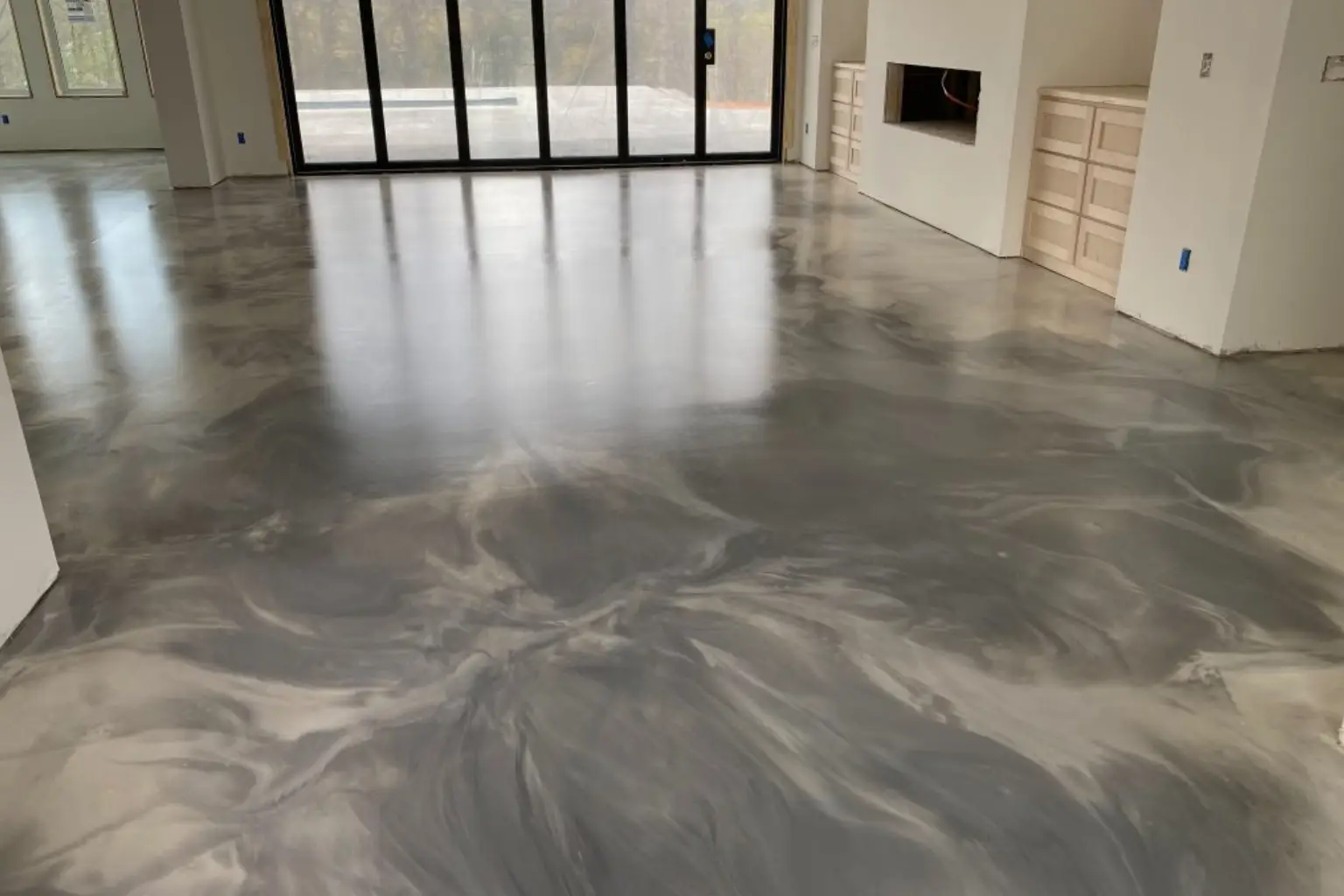
If you’re going for something more decorative, like flake or metallic epoxy, you can expect to be on the higher end of that range, while simple, solid-color coatings usually cost less.
Choosing the right flooring for your home is not just about style. It’s also about durability, safety, and long-term cost. Different areas of the home have unique needs, and selecting the right residential epoxy flooring cost option ensures both beauty and functionality.
Basement Floor Epoxy
Basements often face moisture and humidity, making basement-floor epoxy an ideal solution. Epoxy provides a seamless, waterproof barrier that protects concrete and prevents mold and mildew growth.
Cost Range:
- $3 – $7 per sq ft for solid color epoxy
- $4 – $9 per sq ft for epoxy flake
- $5 – $10 per sq ft for quartz epoxy
Benefits:
- Epoxy floors are highly resistant to moisture, preventing water damage, mold growth, and cracks that often occur in traditional flooring materials like wood or tile.
- These floors feature a seamless, non-porous finish that keeps dust, stains, and spills from seeping in. A quick sweep and mop are usually all it takes to maintain their shine.
- Epoxy floors are built to handle significant weight without denting, cracking, or losing their finish.
Installation Notes:
- Concrete must be fully dried and cracks repaired
- Primer and moisture barrier applied
- 1 – 2 layers of epoxy applied, optional flake or quartz for decoration
- Topcoat sealant for durability
By installing basement-floor epoxy, homeowners can protect their investment and extend the lifespan of their concrete while maintaining a modern, polished look. This is a cost-effective way to upgrade basements without major remodeling, keeping the residential epoxy floor cost manageable.
Garage Epoxy Flooring
Garages experience high traffic, vehicle weight, oil stains, and occasional chemical spills. Garage-epoxy flooring is designed to withstand these conditions while remaining attractive.
Cost Range:
- $4 – $7 per sq ft for solid color
- $5 – $9 per sq ft for epoxy flake
- $6 – $10 per sq ft for quartz epoxy
Benefits:
- Epoxy is designed to resist both slips and chemical spills, making it perfect for garages, workshops, and utility areas.
- The smooth, glossy finish of epoxy helps hide small imperfections, dust, and minor cracks that are often visible on plain concrete.
- These flooring options instantly transform a dull, gray garage into a sleek, modern-looking space.
Installation Notes:
- Concrete prep and cleaning are crucial
- Primer applied to prevent peeling
- Epoxy layer with optional flakes or quartz for texture
- Clear topcoat for extra protection
A polyaspartic floor is durable and low-maintenance, making it a practical choice for homeowners who want functional and stylish flooring for the garage. The cost varies depending on epoxy type, floor size, and additional layers, affecting the overall residential epoxy floors cost.
Living Room Epoxy Floor
For living rooms, homeowners often prioritize style and elegance. Living room epoxy floor options like metallic epoxy or solid color epoxy provide a seamless, luxurious appearance while being easy to maintain.
Cost Range:
- $5 – $12 per sq ft, depending on type
- Metallic epoxy: $6 – $12 per sq ft
- Quartz epoxy: $5 – $10 per sq ft
Benefits:
- Living room epoxy floors offer a sleek, seamless look that enhances the beauty of your space.
- Epoxy flooring is built to withstand constant movement and heavy foot traffic without fading or wearing out.
- Unlike carpet or wood, epoxy floors don’t trap dust, stains, or allergens. A quick sweep and mop are all it takes to keep them spotless.
Installation Notes:
- Surface prep is essential for a flawless finish
- Primer and epoxy layers were applied carefully
- Metallic pigments or quartz aggregates for design
- Protective topcoat seals the finish
A living-room-epoxy-floor offers a high-end aesthetic at a fraction of the cost of hardwood or natural stone, making residential epoxy floor coating cost-justified for long-term value.
Epoxy Kitchen Floor
Kitchens require floors that are durable, stain-resistant, and easy to clean. Epoxy kitchen floor solutions provide a seamless surface that handles spills, dropped utensils, and daily wear.
Cost Range:
- $4 – $8 per sq ft for solid color
- $5 – $9 per sq ft for epoxy flake
- $6 – $10 per sq ft for quartz epoxy
Benefits:
- Epoxy kitchen floors are specially designed to handle everyday kitchen messes. They resist spills, grease, and moisture, preventing stains and damage that often affect tile or wood floors.
- With their smooth, non-porous surface, epoxy kitchen floors are incredibly easy to clean.
- For added protection, epoxy floors can be customized with slip-resistant textures or coatings. This ensures a safer cooking and dining environment.
Installation Notes:
- Concrete prep and cleaning
- Primer and epoxy layers applied
- Optional flake or quartz for decorative effect
- Clear topcoat for durability and shine
Installing an epoxy kitchen floor increases safety and reduces long-term maintenance costs, making residential epoxy resin flooring cost a smart investment for active homes.
Epoxy Bathroom Floor
Bathrooms are moisture-prone areas, making an epoxy bathroom floor an excellent choice for waterproofing and durability.
Cost Range:
- $5 – $8 per sq ft for solid color epoxy
- $6 – $10 per sq ft for quartz epoxy
Benefits:
- Epoxy bathroom floors are designed to resist water absorption, making them ideal for humid environments. Their waterproof surface helps prevent mold and mildew growth.
- With a seamless and non-porous finish, epoxy floors don’t trap dirt, soap scum, or grime.
- Epoxy bathroom flooring is built to last for years without cracking, peeling, or fading.
Installation Notes:
- A proper moisture barrier is essential
- Concrete preparation and primer
- Epoxy application with optional texture for slip resistance
- Sealed topcoat to protect against water exposure
Epoxy-bathroom-floor ensures a safe, hygienic, and attractive surface while maintaining a reasonable residential epoxy floor cost.
Outdoor Epoxy Floors
Outdoor areas such as patios, decks, and walkways require durable, weather-resistant surfaces. Outdoor epoxy floors over stained concrete provide excellent protection while enhancing curb appeal.
Cost Range:
- $5 – $12 per sq ft, depending on epoxy type
- Quartz or metallic epoxy is recommended for high-traffic or decorative spaces
Benefits:
- Outdoor epoxy floors are specially formulated to withstand harsh sunlight, rain, and temperature changes without fading or peeling. Their UV-resistant coating protects the surface from discoloration.
- These floors are designed with textured, slip-resistant surfaces that provide excellent grip even when wet.
- Outdoor epoxy flooring comes in a variety of colors, finishes, and patterns, allowing you to customize patios, driveways, or pool decks to match your home’s exterior.
Installation Notes:
- Concrete must be clean and level
- Primer and epoxy were applied for adhesion
- Topcoat protects against sun, rain, and wear
Outdoor epoxy floors improve durability and aesthetics while offering long-term savings on repairs, affecting residential epoxy floor coating cost.
Other Types of Residential Flooring
Along with room-specific epoxy applications, homeowners can also consider:
- Solid Color Epoxy: simple, affordable, 10 – 15 year lifespan
- Epoxy Flake: textured, slip-resistant, 10 – 15 years lifespan
- Quartz Epoxy: textured and durable, 15 – 20 years lifespan
- Metallic Epoxy: luxury look, custom design, 10 – 20 years lifespan
Factors Affecting Residential Flooring Costs
Understanding what influences residential epoxy flooring cost is essential for budgeting effectively. The final price is rarely just about the material; several factors impact labor, preparation, and installation complexity.
Concrete Preparation
Before applying any epoxy finish, the existing concrete must be properly prepared. In concrete repair, uneven surfaces, such as cracks, or pitting increase the residential epoxy floor cost because installers must grind, patch, or level the floor.
Uneven concrete can cause epoxy layers to peel, bubble, or crack over time. A smooth, level surface ensures longevity and durability. Minor cracks may add $0.50 – $1 per sq ft, while major leveling can increase residential epoxy concrete floor cost significantly.
Performing a detailed inspection before installation helps homeowners anticipate additional costs. Proper concrete prep ensures that your floor looks flawless and lasts decades, making the extra investment worthwhile.
Moisture Barrier
A moisture barrier is critical in areas prone to humidity, like basements, bathrooms, and even some kitchens. Moisture under the concrete can cause bubbling, peeling, or failure of the epoxy layer. Without a moisture barrier, even a high-quality epoxy coating may fail within a few years.
Installing a moisture barrier can add $1 – $3 per sq ft to your residential epoxy floor coating cost, depending on the barrier type and room size.
For wet or below-grade areas, always include a moisture barrier in the budget to protect your long-term investment. Homes without proper moisture management may face higher maintenance costs later, so this upfront expense is essential.
Material Type
The type of material used has a direct effect on pricing. Solid color epoxy is typically the most affordable, while quartz and metallic epoxy are more expensive due to their decorative properties and additional labor.
High-end materials offer better aesthetics, durability, and slip resistance, which increases the residential epoxy floors cost.
Quartz epoxy floor can cost $5 – $10 per sq ft, while metallic epoxy can range $6 – $12 per sq ft. Solid color epoxy may only be $3 – $7 per sq ft.
Choose materials that balance budget and desired aesthetics. If durability is a priority for high-traffic areas like garages or kitchens, investing in quartz or flake epoxy pays off.
The right material selection ensures your floor is both functional and visually appealing without overspending.
Number of Layers
The number of epoxy or sealant layers applied also affects residential epoxy floor cost. Each additional layer adds material and labor time.
More layers provide durability, resistance to scratches, lifespan, and chemical-resistant flooring. For example, garages or industrial-style kitchens may require 2 – 3 layers for optimal performance. Each layer may add $1 – $2 per sq ft. A single-layer floor is cheaper but may require more frequent maintenance.
Discuss with your installer whether multiple layers are necessary based on the floor’s intended use.
Investing in the right number of layers upfront reduces long-term maintenance costs and enhances the floor’s appearance.
Design Complexity
Custom designs, metallic effects, quartz blends, or decorative patterns increase labor time and skill requirements, impacting residential epoxy floor coating cost.
Complex designs require skilled labor, precision, and sometimes more expensive materials to achieve the desired effect. Simple, solid color floors are more affordable, while metallic, marbled, or patterned floors can add $2 – $5 per sq ft.
Choose simpler designs for large or functional spaces like basements and garages, while reserving intricate patterns for high-visibility areas like living rooms or kitchens. Careful planning of design complexity helps manage costs without sacrificing style.
Room Size & Layout
The size and shape of a room directly affect installation labor, which is a major component of residential epoxy flooring cost. Larger rooms require more materials and time, while irregularly shaped rooms may require cutting, edging, and extra preparation.
Straightforward rectangular rooms cost less to cover per sq ft. Odd-shaped areas or rooms with columns, steps, or built-ins can increase labor costs by 10 – 20%.
Provide accurate floor measurements and consider grouping rooms together during installation to save on residential epoxy floor cost. Planning based on room size ensures more predictable budgeting.
Regional Labor Rates
Labor rates vary depending on location, demand, and installer expertise. Cities with higher living costs may have higher labor rates, affecting residential epoxy floors cost. Even with the same materials, labor can significantly influence the final price. High-quality installers may charge more but provide better results and durability.
Regional labor differences can add $1 – $3 per sq ft to the total cost. Compare quotes from multiple certified installers to find the best balance of cost and quality. Understanding regional labor trends helps homeowners plan a realistic budget for their flooring project.
Maintenance of Residential Epoxy Floors
Investing in residential epoxy flooring cost is only part of the story. Proper maintenance is essential to maximize durability, appearance, and long-term savings. Different flooring types and room applications require slightly different care routines, but overall, epoxy flooring is low-maintenance compared to traditional flooring like wood or carpet.

Daily Cleaning and Care
Routine cleaning helps preserve your floor and reduces residential epoxy floor coating cost over time.
- Dust and Debris Removal: Sweep or vacuum daily to prevent grit from scratching the epoxy surface.
- Mopping: Use a damp mop with a mild pH-neutral cleaner 1 – 2 times per week. Avoid acidic or abrasive cleaners as they can damage the topcoat.
- Spill Management: Clean spills immediately, especially in kitchens and bathrooms, to avoid stains or surface damage.
By keeping the surface clean, homeowners extend the life of their floor and reduce residential epoxy floors cost in the long run due to fewer repairs or recoating needs.
Periodic Resealing
Epoxy surfaces often require resealing to maintain their shine, protective layer, and slip resistance.
- Frequency: Solid color and flake epoxy generally need resealing every 3 – 5 years, while quartz and metallic epoxy may need it every 2 – 4 years.
- Cost Impact: Resealing can cost $1 – $3 per sq ft, depending on room size and floor type. This is significantly lower than replacing or repairing damaged flooring.
- Tip: Schedule resealing before the floor shows wear, especially in high-traffic areas like kitchens, living rooms, and garages.
Regular resealing preserves the residential epoxy resin flooring cost value and ensures your floor remains durable and visually appealing.
Preventing Damage
Certain precautions help minimize wear and tear, protecting your investment in the residential epoxy concrete floor cost.
- Furniture Pads: Use felt pads under chairs, tables, and heavy furniture to prevent scratching.
- Avoid Dragging Heavy Objects: Sliding or dragging heavy items can chip the surface of epoxy flooring.
- Protective Mats: Place mats at entryways to trap dirt, moisture, and grit.
These simple steps reduce long-term maintenance costs and keep your floor looking pristine.
Addressing Scratches and Chips
Even the best floors can experience minor damage over time. Fortunately, epoxy floors are relatively easy to repair, which can reduce overall residential epoxy floor cost.
- Small Scratches: Can often be buffed out or repaired with a thin epoxy touch-up kit.
- Deeper Chips: May require sanding and reapplying a small epoxy section.
- Professional Repairs: For significant damage, hiring a professional is recommended to restore the finish and maintain the warranty.
Addressing issues early avoids more costly repairs in the future.
Maintaining Outdoor Epoxy Floors
Outdoor surfaces, such as patios and decks, require extra attention due to exposure to sunlight, rain, and temperature changes.
- UV Protection: Apply a UV-resistant topcoat to prevent yellowing and fading.
- Regular Cleaning: Remove dirt, leaves, and debris to avoid staining or moisture damage.
- Sealant Application: Reapply topcoat every 2 – 3 years, depending on weather conditions.
Proper care ensures outdoor epoxy floors maintain durability and aesthetics, protecting your investment in residential epoxy floor coating cost.
Cost Comparison of Different Residential Epoxy Floors
Understanding how the cost of different types of residential epoxy flooring varies can help you choose the best option for your home and budget. Each type offers its own mix of durability, style, and maintenance needs. Factors like materials, design details, and where the flooring is installed can all affect the total price.
| Flooring Type | Cost per sq ft | Durability | Best Use |
| Solid Color Epoxy | $3 – $7 | 10 – 15 years | Basements, utility rooms, garages |
| Epoxy Flake | $4 – $9 | 10 – 15 years | Garages, high-traffic areas |
| Quartz Epoxy | $5 – $10 | 15 – 20 years | Kitchens, hallways, entryways |
| Metallic Epoxy | $6 – $12 | 10 – 20 years | Living rooms, decorative spaces |
Tips to Reduce Residential Flooring Costs
Maximizing value while controlling residential epoxy floor cost or residential epoxy concrete floor cost is possible with smart planning. Here are practical tips:
- Choose Standard Colors: Solid color epoxy is cheaper than quartz or metallic options.
- Simplify Designs: Intricate patterns increase labor costs; simpler designs are budget-friendly.
- Combine Rooms: Installing multiple rooms together reduces labor charges per sq ft.
- DIY Prep: Performing concrete cleaning and minor repairs yourself lowers labor costs.
- Schedule in Off-Peak Seasons: Some contractors offer lower rates during slower months.
- Limit Layers: Apply the optimal number of layers without overdoing it. Over-applying increases residential epoxy floor coating cost unnecessarily.
- Regular Maintenance: Preventive care reduces long-term repair costs.
Applying these strategies ensures homeowners maximize budget efficiency while getting durable, visually appealing flooring.
Conclusion
Investing in residential epoxy flooring cost is a long-term, value-driven decision. Epoxy floors, whether solid color, flake, quartz, or metallic, provide durability, aesthetics, and easy maintenance for every area of your home, from basements and garages to kitchens, living rooms, bathrooms, and outdoor spaces.
Understanding cost ranges, installation factors, maintenance requirements, and room-specific needs helps homeowners can select flooring that matches both their style and budget.
Ultimately, a well-planned floor upgrade increases home value, enhances functionality, and minimizes future maintenance costs, making the investment in residential epoxy resin flooring cost truly worthwhile.
Various companies in the market provide residential epoxy flooring services, but no one is better than Epoxy Shine. So, contact us at your earliest convenience.
FAQs
What is the average residential epoxy flooring cost?
The residential epoxy flooring cost typically ranges from $3 to $12 per square foot, depending on the material, labor, and surface preparation. High-end finishes like metallic or quartz epoxy are more expensive but offer long-lasting beauty and durability.
Is epoxy flooring suitable for basements and garages?
Yes, epoxy flooring is perfect for both spaces. It’s moisture-resistant, durable, and easy to clean. While the residential epoxy concrete floor cost may increase slightly for moisture barriers, it ensures a longer lifespan and better protection against dampness.
How long do residential epoxy floors last?
With proper care and maintenance, residential epoxy floors can last 10 to 20 years or more. Regular cleaning, resealing, and avoiding heavy impacts can reduce the long-term residential epoxy floor cost by preventing damage and extending durability.
What affects the residential epoxy floor coating cost the most?
The biggest cost factors include surface preparation, material type, design complexity, and room size. High-end finishes like metallic or quartz add to the residential epoxy floor coating cost, but they provide superior aesthetics and durability worth the investment.
Does epoxy flooring increase home value?
Absolutely. A well-installed residential epoxy floor enhances aesthetics, reduces maintenance needs, and improves durability. These benefits increase property appeal and overall resale value, making your investment in residential epoxy resin flooring cost worthwhile.
How do I maintain my residential epoxy floor?
Simple maintenance includes regular sweeping, gentle mopping, and resealing every few years. These steps help maintain shine, prevent scratches, and extend the life of your floor while reducing long-term residential epoxy floors cost from repairs.
What’s the difference between the residential epoxy concrete floor cost and the commercial epoxy?
Residential epoxy concrete floor cost is generally lower than commercial-grade epoxy because home floors face less traffic and wear. Commercial epoxy coatings are thicker and more durable, designed to handle heavy loads and industrial environments.



